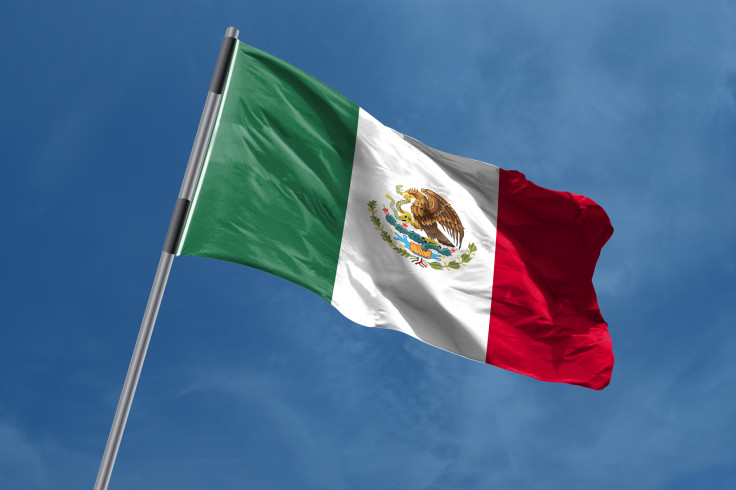
Millions of Mexicans are expected to head to the polls on Sunday to elect their new leader and successor to Andres Manuel López Obrador, also known as AMLO, for a six-year term. The election cycle is set to be truly historic for two reasons.
First, the country known for its "macho" culture is on the verge of electing its first female president, as both leading candidates in the race are women. Obrador's protege, former Mexico City mayor Claudia Sheinbaum Pardo, holds a commanding lead in the polls over her nearest rival, Bertha Xóchitl Gálvez Ruiz.
Second, some 100 million Mexicans, including 12 million living abroad, are eligible to vote in the largest election Mexico has ever seen, with the presidency, over 628 congressional seats, and thousands of local positions at stake. Without a doubt, the biggest election the nation has ever seen.
What else needs to be considered? What are Mexicans' key perceptions about the economy, leadership, institutions and electoral integrity? Here are five things to know before the vote, according to a report by Gallup.
5 Important things to know about Mexican elections
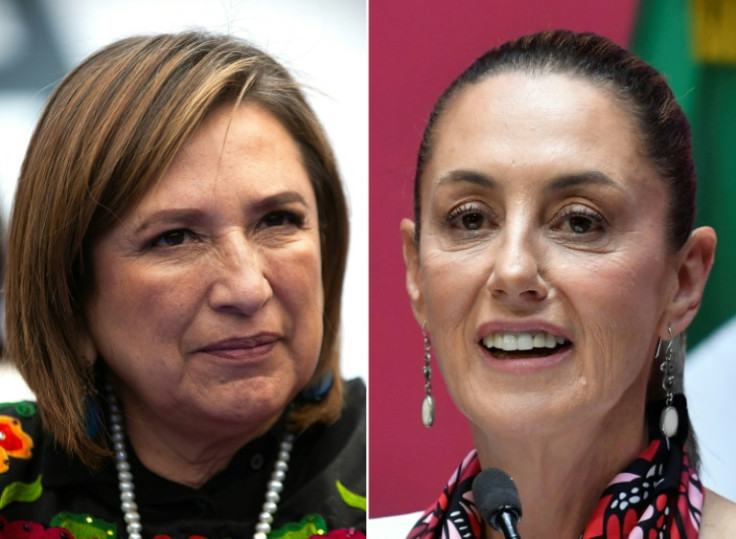
1. Economic Optimism Hits an All-Time High
The economy remains a key issue in elections worldwide, including in the U.S., where polls indicate that most eligible voters believe the country is in a recession, despite this not being the case.
Conversely, in Mexico, optimism about improving living standards (73% "getting better") and the local economy (57% "getting better") has reached its highest level since Gallup began annual surveys nearly two decades ago.
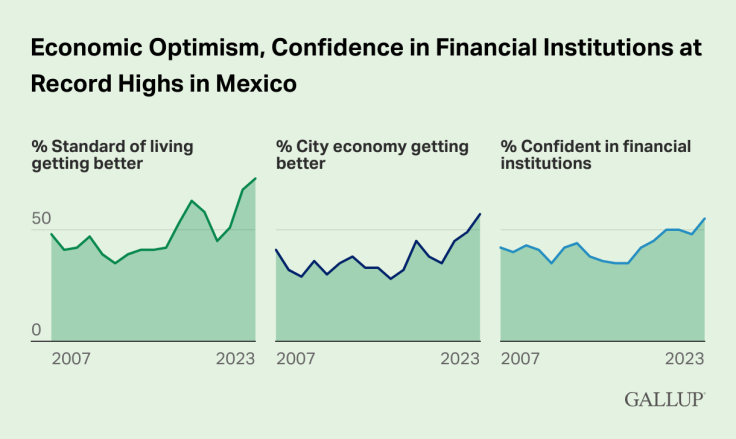
This view is not unfounded. The Mexican economy performed relatively well in 2023 and is projected to experience above-average growth in 2024, driven by decreasing inflation and a slowdown in energy prices.
In a broader context, Mexico was more positive about its economic future in 2023 than almost any other advanced economy. It tied with Costa Rica for first place among OECD (Organisation for Economic Co-operation and Development) countries regarding the belief that living standards are improving and was second only to Denmark (61%) in the belief that local economic conditions are getting better, Gallup reported.
2. Growing Confidence in State, Leaders, and Institutions
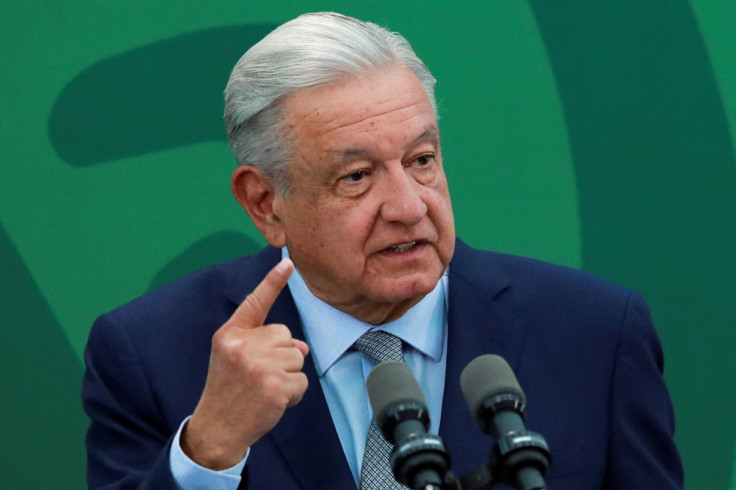
According to Gallup, in 2023, a majority of citizens approved of the country's leadership (53%) and had confidence in the national government (61%), which again were record highs.
In contrast to U.S. citizens' confidence in the national government (30%), Mexico was twice, the report outlines.
AMLO's personal job approval rating has surged to 80% from 67% in 2022, making him one of the most popular leaders globally. Since Gallup began surveying Mexico in 2006, no other leader has achieved such high approval ratings.
Why then didn't AMLO run for re-election? The president clarified on several occasions, even in writing, that he was not interested, but the Mexican constitution does not allow for a second term.
3. Record High Confidence in Elections, Yet Still a Minority
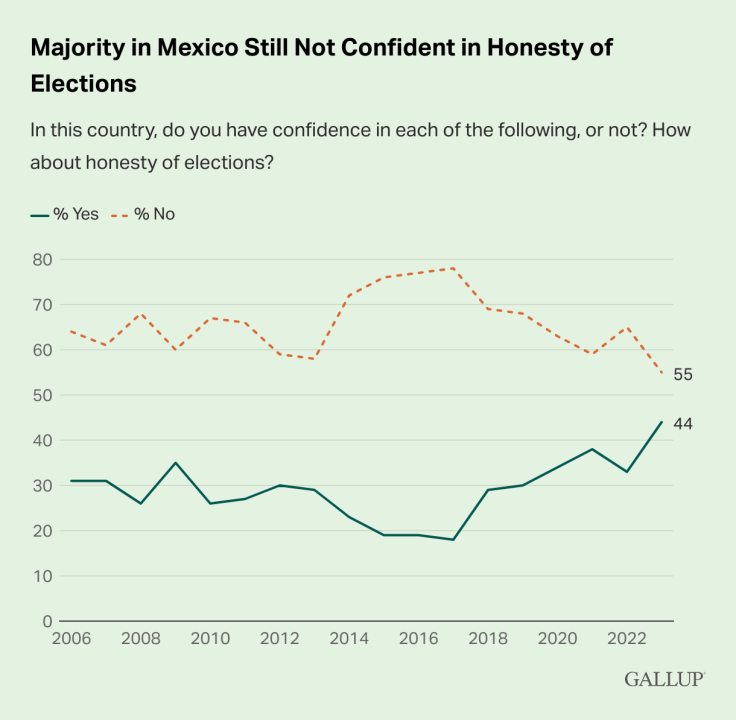
Between 2015 and 2017, only 19% of Mexicans had confidence in the honesty of their elections. However, this confidence has gradually increased, reaching 44% last year, Gallup studies show.
"Although this is the highest point on record since Gallup started surveying Mexico in 2006, those who are confident in honest elections remain a minority. More than half of adults in Mexico (55%) continue to lack faith in the process," Gallup report says.
In Mexico, voting is recognized as a civic duty, but there is no law requiring citizens to vote. Therefore, there are no legal consequences if Mexican eligible voters choose not to vote in the upcoming June 2 elections.
4. Persistent Challenges in Public Safety Persist
The issue that has remained constant is that of public safety, Gallup underscores. Throughout much of the past decade, a majority of individuals have felt unsafe walking alone in their neighborhoods at night, with the figure standing at 54% in 2023.
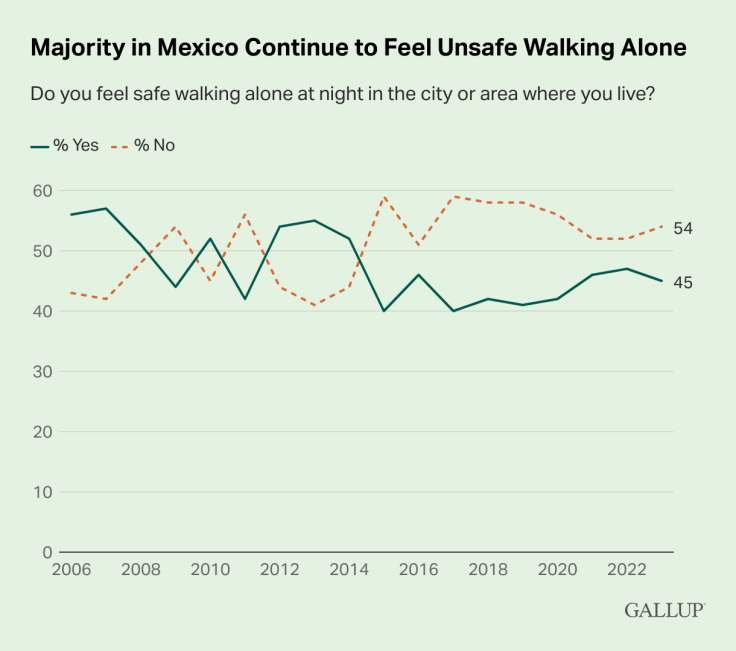
Public safety and insecurity have been central themes in the electoral campaign. According to the most recent official data, January 2024 concluded with 2,433 homicide victims, representing a five percent increase compared to cases reported in December 2023.
In addition, 30 candidates for various public offices have been assassinated since September, when the official election campaign began.
Opposition candidate Jorge Álvarez Máynez has vowed to take a tough stance on crime and construct a new state-of-the-art, high-security prison similar to one recently erected in El Salvador.
5. Mexico's Uncertain Position on the Global Stage
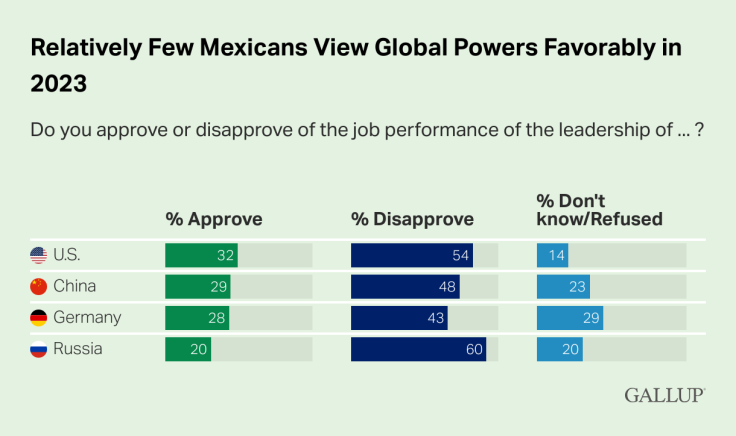
Gallup underscores the intricate web of international relationships Mexico must navigate, particularly as the country emerges as the United States' largest trading partner, surpassing China.
However, less than a third of Mexicans approve of U.S. leadership, a sentiment that aligns closely with approval ratings of China (29%) and Germany (28%).
The disapproval of Washington's leadership outweighs that of Beijing or Berlin, largely due to greater familiarity with the U.S., with a significant number expressing no opinion about China and Germany.
Moscow receives the least favorable view, with three times as many individuals disapproving as approving (60% vs. 20%) of Russia's leadership. The report highlights Mexico's criticism for its reluctance to impose sanctions against Russia following the invasion of Ukraine.
© 2025 Latin Times. All rights reserved. Do not reproduce without permission.





